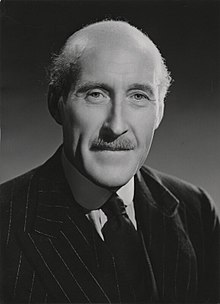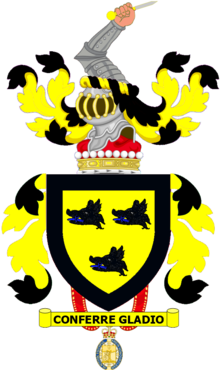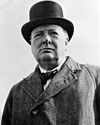Harry Crookshank
The Viscount Crookshank | |
|---|---|
 | |
| Minister of Health | |
| In office 30 October 1951 – 7 May 1952 | |
| Prime Minister | Winston Churchill |
| Preceded by | Hilary Marquand |
| Succeeded by | Iain Macleod |
| Leader of the House of Commons | |
| In office 30 October 1951 – 20 December 1955 | |
| Prime Minister | Winston Churchill Sir Anthony Eden |
| Preceded by | James Chuter Ede |
| Succeeded by | Rab Butler |
| Personal details | |
| Born | 27 May 1893 Cairo, Khedivate of Egypt |
| Died | 17 October 1961 (aged 68) Chelsea, London |
| Nationality | British |
| Political party | Conservative |
| Alma mater | Magdalen College, Oxford |

Harry Frederick Comfort Crookshank, 1st Viscount Crookshank, CH, PC (27 May 1893 – 17 October 1961), was a British Conservative politician. He was Minister of Health between 1951 and 1952 and Leader of the House of Commons between 1951 and 1955.
Background and education
[edit]Crookshank was born in Cairo, Egypt, the son of Harry Maule Crookshank and Emma, daughter of Major Samuel Comfort, of New York City. On his father's side, he descended from Alexander Crookshank, of County Longford, Ireland, who represented Belfast in the Irish House of Commons and served as a Justice of the Court of Common Pleas in Ireland. He was educated at Eton and Magdalen College, Oxford. In the First World War, he joined the Hampshire Regiment and served as a captain in the Grenadier Guards.[citation needed] On one occasion he was buried alive by an explosion for twenty minutes, and on another in 1916 he was castrated by shrapnel, requiring him to wear a surgical truss for the rest of his life.[1] He was awarded by Serbia the Order of the White Eagle and Gold Medal for Valour.[2]
He joined the Diplomatic Service in 1919 and worked at the British Embassy in Washington, D.C., until 1924.
Political career
[edit]Crookshank was elected Member of Parliament (MP) for Gainsborough in 1924, a seat he held for the next 32 years.[3] He entered the government as Under-Secretary of State for the Home Department in 1934 under Ramsay MacDonald. When Stanley Baldwin became prime minister in 1935 Crookshank was appointed Secretary for Mines, a post he retained when Neville Chamberlain became prime minister in 1937 until February 1939. Crookshank called Chamberlain "crazed and hypnotised by a loony" to have accepted the Munich Agreement and sent a letter of resignation in protest, but was convinced to rescind it.[4] In the latter year, he was sworn of the Privy Council[5] and made Financial Secretary to the Treasury. He continued in this post also when Winston Churchill came to power in 1940, and was then Postmaster General under Churchill between 1943 and 1945.[3] In 1942 he was offered the post of British Minister Resident in the Mediterranean at Algiers following the liberation of Algeria by Operation Torch but he declined, Harold Macmillan being appointed instead.[6]
When the Conservatives returned to office under Churchill in 1951, Crookshank was appointed Minister of Health and Leader of the House of Commons, with a seat in the cabinet. In 1952 exchanged his post at the Ministry of Health for the sinecure post of Lord Privy Seal, while he remained as Commons Leader. He continued in these two positions until December 1955, the last year under the premiership of Sir Anthony Eden.[citation needed] In the 1955 New Year Honours he was made a Member of the Order of the Companions of Honour.[7][3] He retired from the House of Commons in 1956 and was raised to the peerage as the Viscount Crookshank, of Gainsborough in the County of Lincoln, in January of that year.[3][8] He had been offered a peerage in February 1940 but declined, having considered it at the time an insult because his First World War wounds had left him incapable of fathering any heir to a title.[9]
Papers released by The National Archives, London, November 2007, show that Crookshank, with Harold Macmillan, led a faction within the third Churchill ministry who opposed what they perceived to be an attempt to bounce the Cabinet into a premature decision to authorise a British thermonuclear bomb programme in July 1954.[citation needed]
Personal life
[edit]Lord Crookshank was a Scottish Rite Freemason and Grand Master of Lincolnshire.[10]
Incapable as result of his First World War wounds of fathering children, Crookshank was a lifelong bachelor. He was also (not publicly) known as a homosexual and caused a near scandal when a male lover of his was adopted as Conservative Party candidate for the Grimsby constituency in 1958 but later withdrawn.[9][11] According to Chris Bryant he was a member of the Glamour Boys.[12]
His home from 1937 was at 51 Pont Street, Kensington, London, where in 1947 he hosted a meeting of like-minded backbench MPs who unsuccessfully demanded Churchill's removal as Leader of the Conservative Party.[9]
He died of cancer[9] at Chelsea, London, in October 1961, aged 68. The viscountcy died with him.[citation needed] Having been since 1960 High Steward of the City of Westminster, his funeral service took place at Westminster Abbey, followed by burial at Lincoln Cathedral.[9] His sister, Helen Elizabeth Comfort Crookshank (1895–1948), lies next to him.

|
|
References
[edit]- ^ Ball 2004, p. 41, 60
- ^ Dictionary of National Biography, 1961–1970. Oxford University Press. 1971. p. 249. ISBN 0-19-865207-0.Article by Viscount Chandos.
- ^ a b c d "Crookshank 1st Viscount cr 1956, of Gainsborough (Harry Frederick Comfort Crookshank)". Who's Who. A & C Black. (Subscription or UK public library membership required.)
- ^ Bouverie, Tim (2019). Appeasement: Chamberlain, Hitler, Churchill, and the Road to War (1 ed.). New York: Tim Duggan Books. p. 288. ISBN 978-0-451-49984-4. OCLC 1042099346
- ^ "No. 34595". The London Gazette. 3 February 1939. p. 751.
- ^ Horne, Alistair (1988). Macmillan Volume I: 1894–1956. Macmillan. pp. 151–160. ISBN 978-0-333-27691-4.
- ^ "No. 40366". The London Gazette (Supplement). 1 January 1955. p. 28.
- ^ "No. 40684". The London Gazette. 13 January 1956. p. 278.
- ^ a b c d e Ball, S. J. "Crookshank, Harry Frederick Comfort, first Viscount Crookshank (1893–1961)". Oxford Dictionary of National Biography (online ed.). Oxford University Press. doi:10.1093/ref:odnb/32641. (Subscription or UK public library membership required.)
- ^ Walton Hannah, Christian by Degrees (London: Britons Publishing Company, 1954), 211.
- ^ The Conservative candidate for Grimsby at the 1959 and 1964 elections, Wilfred Pearson, was not the same man.
- ^ Millen, Robbie. "The Glamour Boys by Chris Bryant review — the gay MPS who stood up to Hitler".
- ^ Burke's Peerage. 1959.
Books cited
[edit]- Ball, Simon (2004). The Guardsmen. London: HarperCollins. ISBN 978-0-00-257110-4. (a joint biography of Harold Macmillan, Lord Salisbury, Oliver Lyttelton and Crookshank)
External links
[edit]- 1893 births
- 1961 deaths
- Royal Hampshire Regiment soldiers
- 20th-century English LGBTQ people
- British Army personnel of World War I
- Castrated people
- Conservative Party (UK) MPs for English constituencies
- British Freemasons
- Grenadier Guards officers
- Leaders of the House of Commons of the United Kingdom
- Lords Privy Seal
- Members of the Order of the Companions of Honour
- Members of the Privy Council of the United Kingdom
- Ministers in the Chamberlain peacetime government, 1937–1939
- Ministers in the Chamberlain wartime government, 1939–1940
- Ministers in the Churchill caretaker government, 1945
- Ministers in the Churchill wartime government, 1940–1945
- Ministers in the Eden government, 1955–1957
- Ministers in the third Churchill government, 1951–1955
- Viscounts created by Elizabeth II
- People educated at Eton College
- People educated at Summer Fields School
- UK MPs 1924–1929
- UK MPs 1929–1931
- UK MPs 1931–1935
- UK MPs 1935–1945
- UK MPs 1945–1950
- UK MPs 1950–1951
- UK MPs 1951–1955
- UK MPs 1955–1959
- UK MPs who were granted peerages
- Postmasters general of the United Kingdom
- LGBTQ members of the Parliament of the United Kingdom
- LGBTQ peers
- English LGBTQ politicians
- Burials at Lincoln Cathedral
- Deaths from cancer in England


